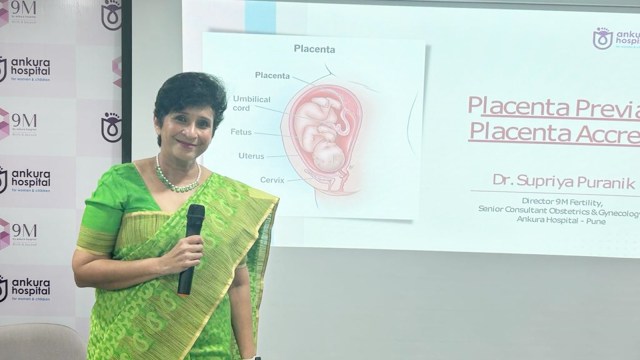Click here to join Express Pune WhatsApp channel and get a curated list of our stories
At Ankura hospital, Pune doctors successfully manage high risk pregnancies
Managing high risk pregnancies requires a highly skilled medical team, often including obstetricians, neonatologists and anaesthesiologists.
 Dr Supriya Puranik is the Director of 9M Fertility and a renowned Infertility Specialist, high-risk Obstetrician, and Gynaecologist.(Express photo)
Dr Supriya Puranik is the Director of 9M Fertility and a renowned Infertility Specialist, high-risk Obstetrician, and Gynaecologist.(Express photo) Unexpected twists can arise during pregnancy, leading to intricate and risky situations.
At Pune’s Ankura Hospital, a team consisting of Dr Supriya Puranik alongside Dr Nikhil Hiremath successfully managed the complicated pregnancies of three women who were confronted with formidable challenges at nine months gestation due to an uncommon and demanding condition known as central placenta previa with accreta.
Dr Puranik is the Director of 9M Fertility and a renowned Infertility Specialist, high-risk Obstetrician, and Gynaecologist while Dr Hiremath is the head of the anaesthesia department and the critical care unit.
“From physical discomforts, growth-restricted babies, gestational diabetes, gestational hypertension, delivery complications and hormonal imbalances to emotional ups and downs, pregnancy brings a roller-coaster of changes that require careful attention. However, the significance of proper management extends beyond just the well-being of the mother. It also directly impacts the health of an unborn child,” says Dr Puranik, who is also the Senior Consultant Obstetrics & Gynaecology of Ankura Hospital in Pune.
“Placenta accreta is a grave pregnancy complication characterised by abnormal placenta into the uterine wall. Placenta Previa and Placenta Accreta are two pregnancy complications that, although rare, can pose serious risks to both the mother and the baby,” Dr Purnaik adds.
She further says, “These conditions occur when the placenta, the vital organ that nourishes the growing foetus, does not implant, leading to potential complications. Placenta Previa and Placenta Accreta are relatively rare, occurring in approximately 0.3 per cent to 0.5 per cent of pregnancies. Placenta Previa is more common among pregnancies in the first trimester and usually corrects itself by the third trimester. In contrast, Placenta Accreta is even rarer, with an estimated incidence of 1 in 2,500 pregnancies.”
“The exact causes of these conditions are not entirely understood but several factors may contribute. Placenta Previa occurs when the placenta implants low in the uterus, often covering the cervix. It may be linked to prior uterine surgeries, multiple pregnancies or advanced maternal age,” she says.
Dr Purnaik adds, “Placenta Accreta is associated with abnormal attachment of the placenta to the uterine wall, often due to uterine scarring from previous surgeries like Cesarean sections. For the mother, Placenta Previa may lead to heavy bleeding, which can be life-threatening. Placenta Accreta can result in massive haemorrhage during delivery and may necessitate a hysterectomy to control bleeding, which ends a woman’s fertility. These conditions can also lead to premature birth, low birth weight and other complications that put the baby at risk.”
Narrating the cases, Dr Puranik said a 33-year-old housewife from Pune was admitted to the hospital at 32 weeks of pregnancy due to excessive bleeding.
Her central placenta previa was successfully treated and she left the Neonatal Intensive Care Unit (NICU) with her healthy baby.
Another woman, a 30-year-old housewife from Aurangabad in her 19th week of pregnancy was a severe case of placenta previa where the placenta had gone out of the uterine wall and was trying to attach the bladder. Her pregnancy was terminated at 19 weeks. The patient shifted to Pune and was advised to undergo a hysterectomy, so as to save the uterus.
The third woman, also a 30-year-old housewife from Pune, required emergency surgery to ligate her internal iliac artery to control the bleeding. The uterine portion where the placenta was attached was resected and reconstructed. All three patients received effective care at Ankura Hospitals.
Managing them requires a highly skilled medical team, often including obstetricians, neonatologists and anaesthesiologists.
The delivery timing and the choice of delivery method (cesarean section or vaginal birth) must be carefully considered to minimise risks.
“Placenta Previa and Placenta Accreta are challenging pregnancy complications that necessitate close monitoring throughout pregnancy. Women with these conditions may require bed rest, blood transfusions, and early delivery, often via cesarean section. The goal is to balance the needs of both the mother and the baby while minimizing the risks associated with these conditions,” Dr Purnaik said.
“Dr Supriya Puranik and the Ankura team have not only saved lives but have also restored the possibility of future pregnancies,” Dr Siddharth Madabhushi, Assistant Medical Director, at Ankura Hospital, said.
Click here to join Express Pune WhatsApp channel and get a curated list of our stories







